Hoping to put their lives back together, over 500 of them have taken refuge at a temporary camp set up in Thane; 160 other families are in Ghatkopar
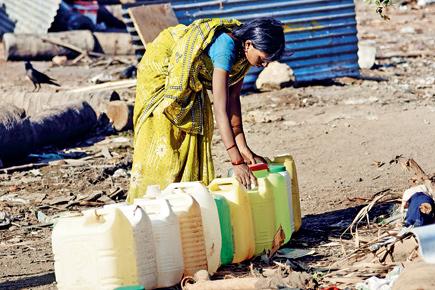
Raobai Madhav Rathod was overwhelmed and transfixed by a running tap; it had been two years since she had last seen such a sight. The 22-year-old was driven out of her village, Bashwadi, in Mukhed taluka in Nanded district by an unrelenting drought. Mumbai, it turned out, held out hope — of a fresh start and better living conditions.
ADVERTISEMENT
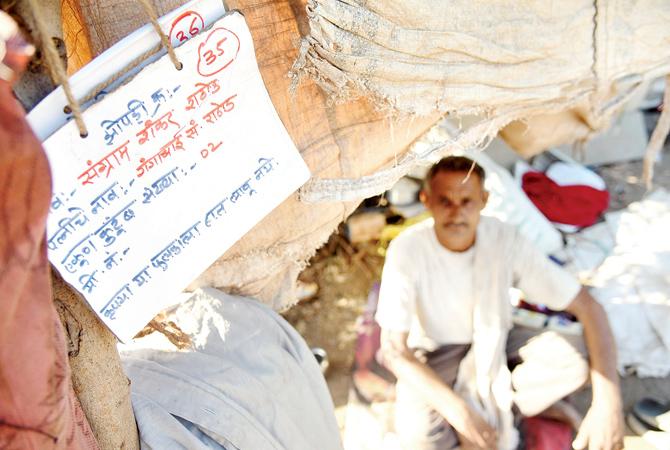
Home, sweet home: Shangram Rathod in his makeshift tent
Raobai is among over 500 migrants from the taluka who have taken shelter at a temporary camp in Wagle Estate in Ramnagar, Thane, which was set up 15-20 days ago. Facilities at the 1-acre camp are bare minimum, but that has done little to dampen the migrants’ hope of cobbling up their lives back together. Hundreds of such migrants from drought-hit Nanded and Marathwada have taken refuge at Thane and Ghatkopar.
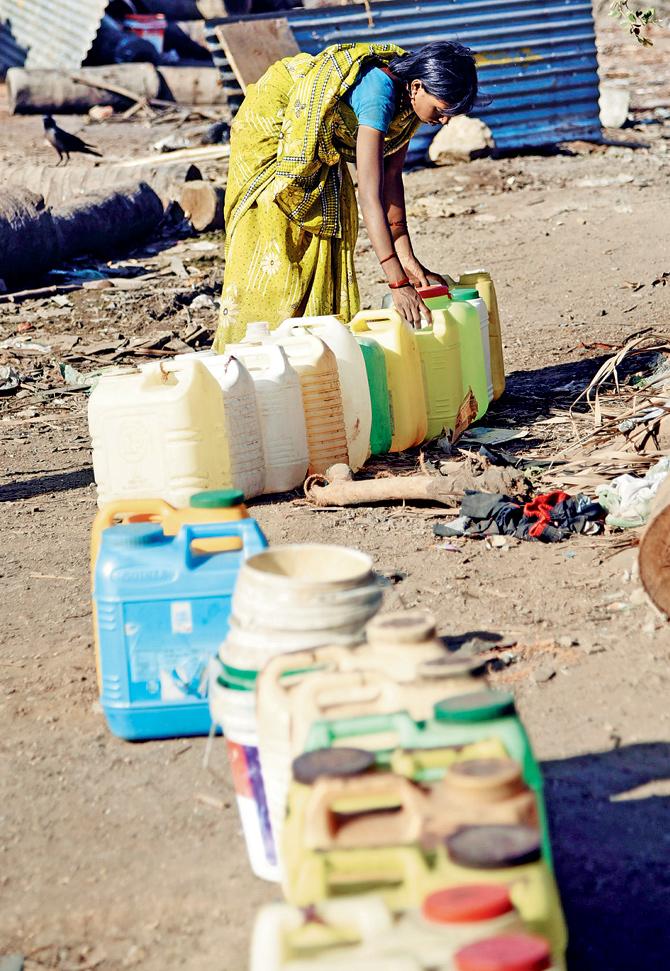
"My husband died two years ago. I somehow managed to provide for my son in my village since then, but this year, the drought is harsher. My village gets water only through tankers. We had no choice but to join the people who were moving to Mumbai for better opportunities. If it doesn’t rain this year, the villagers will have nothing left to eat; our village is largely dependant on agriculture," said Raobai Madhav (22).
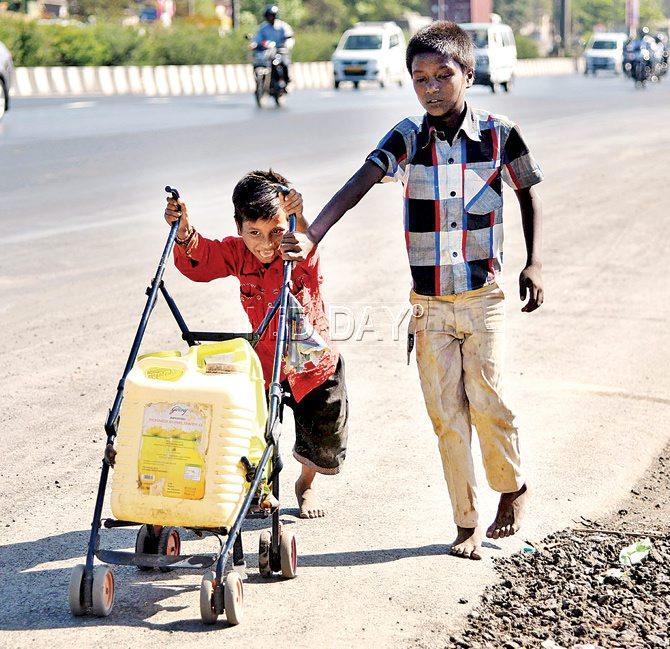
Lost childhood: Many migrants have settled along the Eastern Express Highway near Ghatkopar. Their struggle for water and other basic amenities is still on. Pics/Sameer Markande
Chasing a mirage
For two months, Ramrao Rathod (45), a farmer from Mukhed taluka, dithered over taking a call on leaving his village, Barahali, behind. "There was no water to irrigate the land; neither was their enough food," he said.
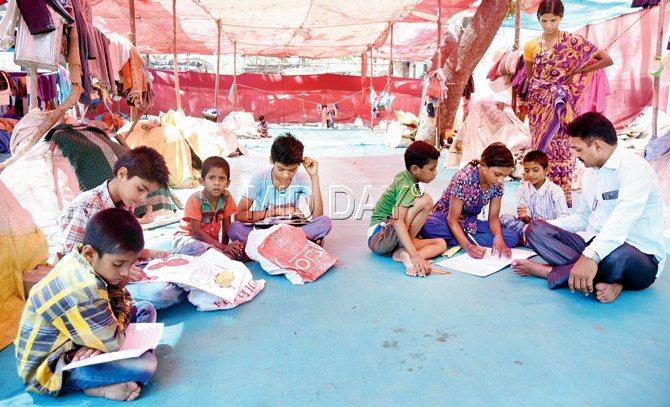
The Write Way: To ensure that the children of migrant families do not skip their education, volunteers at the Thane camp take regular classes.
His wife, Sushilabai (40), said their parched village received water from two tankers just once a week. "How could two tankers be sufficient for a population of 2,000? On a good day, we had to queue up for water for only six hours; most other times, we stood there for 12 hours. All that trouble was for just two buckets of water of week. How could one run a household with those?" The couple has two sons — one of whom has been admitted to a hostel back in Mukhed to ensure that he can focus solely on clearing the CET examinations — and a married daughter.
The Rathods rallied forces with four other families and pooled in all their savings into digging a borewell. "Each family spent Rs 10,000 on it," said Sushilabai. But the borewell yielded no water.
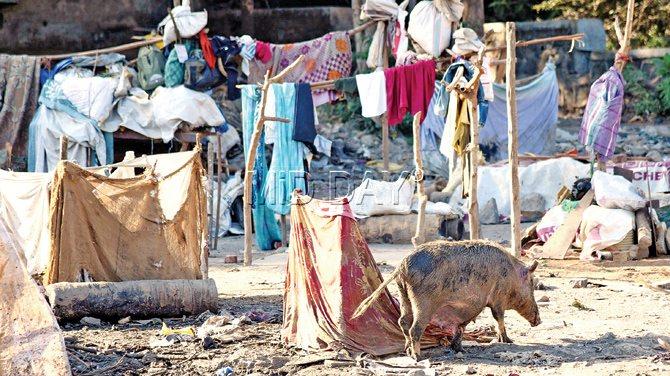
Home, sweet home: Shangram Rathod in his makeshift tent
That was the last straw. Ramrao and his family finally moved to Mumbai and arrived at a makeshift camp in Bhatwadi, Ghatkopar East, with a bunch of villagers. But the migrants were put off by the condition of the area and the apathy of locals. "There were too many stray animals around, the area was dirty and the locals were not willing to share their water with us. So, we left the place," complained Ramrao. The group found its way to the Thane camp a week ago.
Landing jobs
The Rathods are now employed as daily-wage labourers at a construction site nearby. Over 200 migrants have found work at construction sites with the help of Shiv Sena minister Eknath Shinde. A woman labourer is paid R300 per day, while a man earns R400. “At least have a job now to get us through tough times,” said Rathod, hopeful of better tidings in future.
Shinde told mid-day that he was moved by the pitiable situation the migrants in Gahatkopar were in. "There was an open drain nearby and too many strays. We immediately set up a shelter at Thane and asked the people to shift there. Besides providing them jobs, we are also helping them get food and books for the children. The families can stay on till the monsoon. Then, they can decide on going back to their village." Doctors have also been roped in at the Thane camp.
A home of their own
Numbers are all that matter at the makeshift shelter in Bhatwadi in Ghatkopar East. Each tent here is given a number — for each of the 160 migrant families from Mukhed taluka in Nanded district residing in 700 jhopdis. But a tent doesn’t ensure adequate supply of water. The families still line up with small cans for water. A few others depend on the generosity of the locals.
Balaji Chavan (46) from Ravankola village, who runs Bhatwadi’s affairs, said most migrants are daily-wage labourers. “Litters of pigs and open drains are a health hazard. But we have no choice because we get water here.” Bhatwadi has seen a steady influx of migrants over the years. The families from Mhuked made it their home a month ago.
Shangram Rathod (50), a farmer who arrived recently from Bashwadi, said he abandoned his land, spanning across acres, due to water shortage.
Shamkabai Ramrao Rathod (22), who left Barahali with her husband and children, said the family plans to stay on in Mumbai. “There is nothing left for us back at home. Working as a labourer is better than being a farmhand in a village with no water,” her voice ominously trailed off.
 Subscribe today by clicking the link and stay updated with the latest news!" Click here!
Subscribe today by clicking the link and stay updated with the latest news!" Click here!






